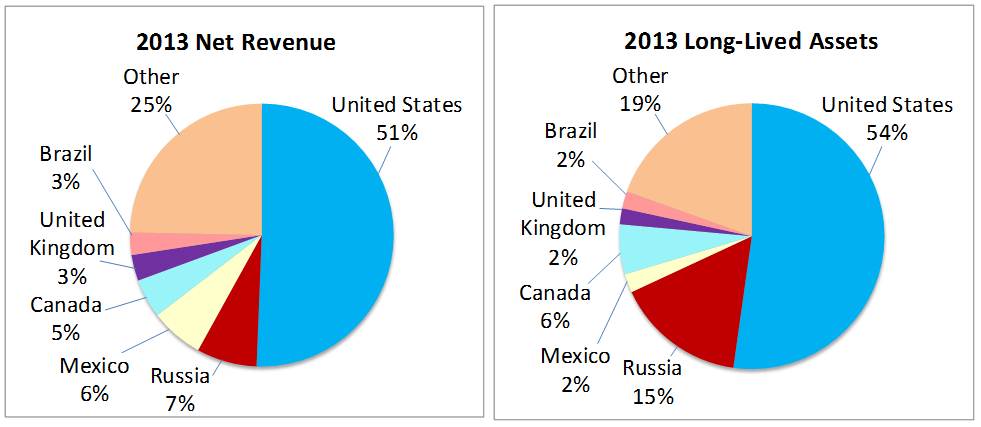
McDonald's in St. Petersburg, Russia. Source: Wikimedia Commons.
The escalating war of words and deeds over Russia's annexation of Crimea is obviously a concern for world peace, but barring the new Cold War between the U.S. and Russia turning hot -- a situation many doubt will actually happen -- the acquiescence of the West to Vladimir Putin's ambitions to reassemble the former Soviet empire also threatens how international businesses are able to function. The first casualty may be McDonald's (MCD 0.38%).
Putin on the ritz
Although Putin has apparently withdrawn tens of thousands of troops from the Ukrainian border, as many as 15,000 remain in place and NATO commanders say Russia could invade at any moment and conquer the country in mere days. Considering Putin had promised not to invade Ukraine at all but used as a pretext Crimea's vote for independence to immediately roll tanks into the country anyway, it wouldn't be so far afield for the Russian president to begin reassembling the old Soviet Union.
The first western casualty in this war, however, may be McDonald's, which announced last week it had closed three of its Crimean restaurants because they were unable to reliably get supplies from Kiev due to the conflict. Although they said employees at its Simferopol, Sevastopol, and Yalta restaurants could relocate to any other restaurant in the region, nationalist Russian politician Vladimir Zhirinovsky says the closures are a provocation and the chain should be expelled from Russia.
The U.K.'s Telegraph newspaper calls Zhirinovsky the "court jester" of Russian politics, but they also admit his often outrageous pronouncements often serve as trial balloons for policy that eventually become reality. That ought to give PepsiCo (PEP +0.03%) pause as well, since he said they'll first go after McDonald's and then take on the beverage giant next.
Eating Big Mac's lunch
McDonald's is taking shots from all sides. Beyond just the usual burger competition, the profitable and expanding breakfast daypart is becoming a breeding ground for rivals to test out new products, like the new waffle offerings from Taco Bell and White Castle seeking to skim dollars off McDonald's dominating position. Convenience stores as well have been siphoning off customers and revenues by presenting new fresh foods catering to the grab-and-go crowd. As a result, U.S. same-store sales at McDonald's fell 1.4% last quarter and were flat for all of 2013 as guest counts fell, even though it enjoyed higher average check values.
Yet Russia has been a bright spot for the burger king amid many dark ones. Along with the U.K., France, and Germany, Russia is part of McDonald's European division that accounts for 40% of its total annual revenues and those four countries amount to two-thirds of the region's total. With sales growing at 5.5% in 2013, Europe was its best-performing region and that was largely due to expansion in Russia where it witnessed a sharp increase in sales. If McDonald's gets cast out of Russia, its ability to keep its head above water becomes seriously compromised.
Refreshing the world
Pepsi generates 7% of its revenues from Russia but has 15% of its assets located there, with only the U.S. having more. Particularly because of strong growth in its snack foods division, it was able to see total sales grow last year as Russia was Pepsi's second best-performing geographic region behind Mexico.

Source: PepsiCo 2013 10-K filing.
With Russian politicians literally laughing at sanctions that are being imposed, and perhaps believing the West has no taste for more war, an aggressive Vladimir Putin with larger ambitions may impinge the ability of businesses like McDonald's and PepsiCo to safely do business there, an untenable situation that would have a significant impact on growth and profitability.